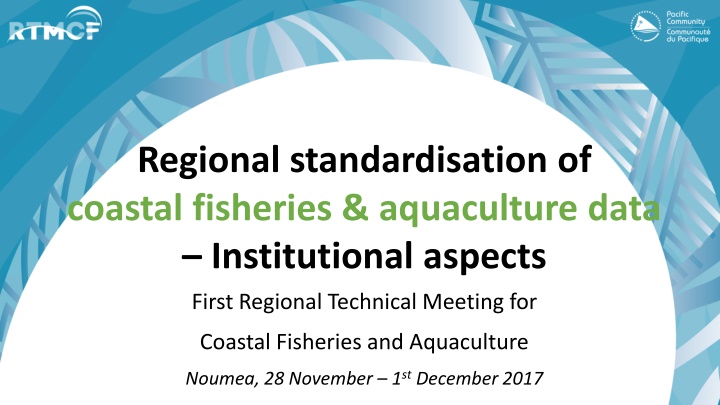
Institutional Aspects of Regional Standardisation for Coastal Fisheries & Aquaculture Data
Explore the institutional aspects of regional standardisation for coastal fisheries and aquaculture data, including meeting outcomes, pros and cons, minimum standards for core data, discussion points for a data standards committee, and a comparison with a similar initiative in Pacific fisheries.
Download Presentation

Please find below an Image/Link to download the presentation.
The content on the website is provided AS IS for your information and personal use only. It may not be sold, licensed, or shared on other websites without obtaining consent from the author. If you encounter any issues during the download, it is possible that the publisher has removed the file from their server.
You are allowed to download the files provided on this website for personal or commercial use, subject to the condition that they are used lawfully. All files are the property of their respective owners.
The content on the website is provided AS IS for your information and personal use only. It may not be sold, licensed, or shared on other websites without obtaining consent from the author.
E N D
Presentation Transcript
Regional standardisation of coastal fisheries & aquaculture data Institutional aspects First Regional Technical Meeting for Coastal Fisheries and Aquaculture Noumea, 28 November 1stDecember 2017
HOF10 Meeting Outcomes 2017 HOF10 Meeting Outcomes 2017 (53) suggested SPC convene a preliminary strategy meeting to develop the Terms of Reference for a formal body to ensure regional data standardisation and maintenance of minimum data standards that encompasses all small-scale domestic fisheries.
Pros & cons Pros & cons Data quality to meet reporting obligations Data consistency on the regional level Robust science needs long-term data * Meeting costs and logistics Legal framework for CF&A data governance
Minimum standards for core data Minimum standards for core data Regionally-agreed data format for exchange Same reference data/controlled vocabulary Step 1 Regionally-agreed data collection method Same form fields/structure and sampling design Step 2 Regionally-agreed database system for data entry Possibly, regional database for data storage Step 3
Discussion points for a CF&A DSC Discussion points for a CF&A DSC Reporting line/authorising body (HOF, CFWG ) Scientific guidance (data needed, analysis ) Mandate and functions (minimum data standards ) Membership (managers, data, IT, partners ) Meetings (frequency, functioning ) See options in Information Paper No. 10
Similar yet different Similar yet different In-house example in Pacific fisheries Tuna Fishery Data Collection Committee Initiated in 1995 as a voluntary meeting To assist PICTs in complying with mandatory requirements of international law for highly migratory fish stocks New TOR 2016-2020 to improve efficiency
Data Collection Committee Data Collection Committee Setup Setup First meeting was in 1995 Convened as an Ad Hoc meeting on Tuna fisheries Data Collection Forms Stated objective was to develop standardised tuna fishery collection form to reduce the complexity of data collection, processing and analysis Committee made up of SPC and FFA staff, with invited guests from member countries and industry 56 logsheet formats revised down to three during first meeting!
Data Collection Committee Data Collection Committee - - Mandate Mandate For the first 5 years there was no legal mandate for DCC DCC worked with SPC, FFA membership Voluntary implementation of DCC forms achieved 5% logsheet implementation after year one 85% logsheet implementation after year five In 2001 the DCC was tabled at the MCSWG and subsequently presented to FFC48 where it was adopted
Data Collection Committee Data Collection Committee mandate contd. mandate contd. Schematic diagram of the relationship of DCC with the annual regional work programme with respect to fisheries. Note that this is focused on the DCC role and does not try to reflect all connections for other identified bodies. Legend: Blue - WCPFC processes; Green - FFA/SPC processes; Orange - subregional processes; Dashed (- - -) lines informal links; Solid ( ) lines formal links.
Data Collection Committee Data Collection Committee National participation National participation Many examples of DCC using national forms and inputs Observer forms built from FSM observer data standards LL economic data form come from Fiji DCC proposed withdrawing pollution data, but member countries resisted this Currently mini-DCC (preparatory meetings) are with technical staff from interested member countries
Data Collection Data Collection Committee Use of standardised data over a long time frame is the basis of robust scientific investigation (climate change etc.) Standardised data sets will allow coastal fisheries to: Compare work from different areas and Build up a time-series of minimum data across projects Considering WCPFC minimum data standards and EREM platforms, DCC reviewed its role in 2016 DCC Strategy 2016 recognised the need for DCC to continue new TORs DCC focus is now on creating standards to facilitate the development of products capable of delivering appropriate outputs for the regional management and data repository structures Committee Long term Long term
Tuna DCC vs CF&A DSC Tuna DCC vs CF&A DSC DCC achieved a lot without any direct mandate in the early years Consensus was not always easy late nights- but the benefits are worth it No national form ? - the work goes else where (quality systems, e- systems, EREM, data collection procedures) More lessons, more progress Different countries could author different sets of forms, but reviewed by DSC Standardised training and recognised certification (PIFRO) DSC may be different (e.g. no scientific body or legal mandate), but DCC went a long way
THANK YOU! THANK YOU! MERCI! MERCI! GRAZIE! GRAZIE! Ariella D Andrea, Coastal Fisheries and Aquaculture Legal Adviser, ariellad@spc.int Franck Magron, Coastal Fisheries Information and Database Manager, franckm@spc.int Deirdre Brogan, Fisheries Monitoring Supervisor (OFP), deirdreb@spc.int
